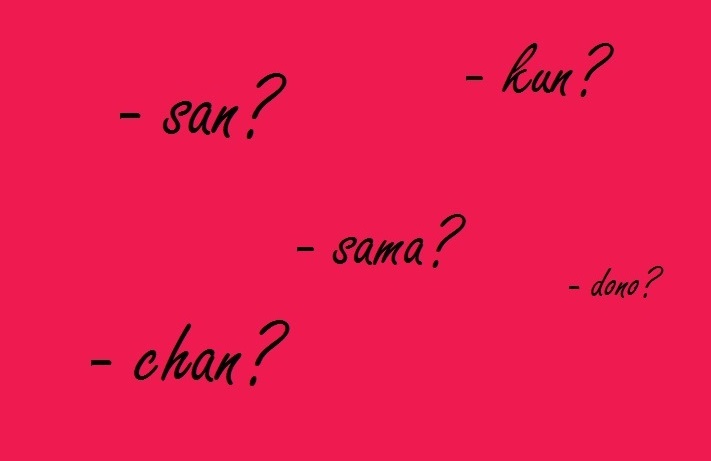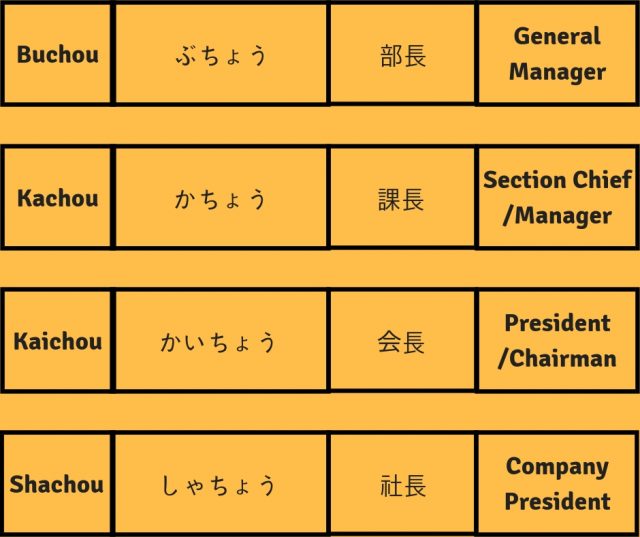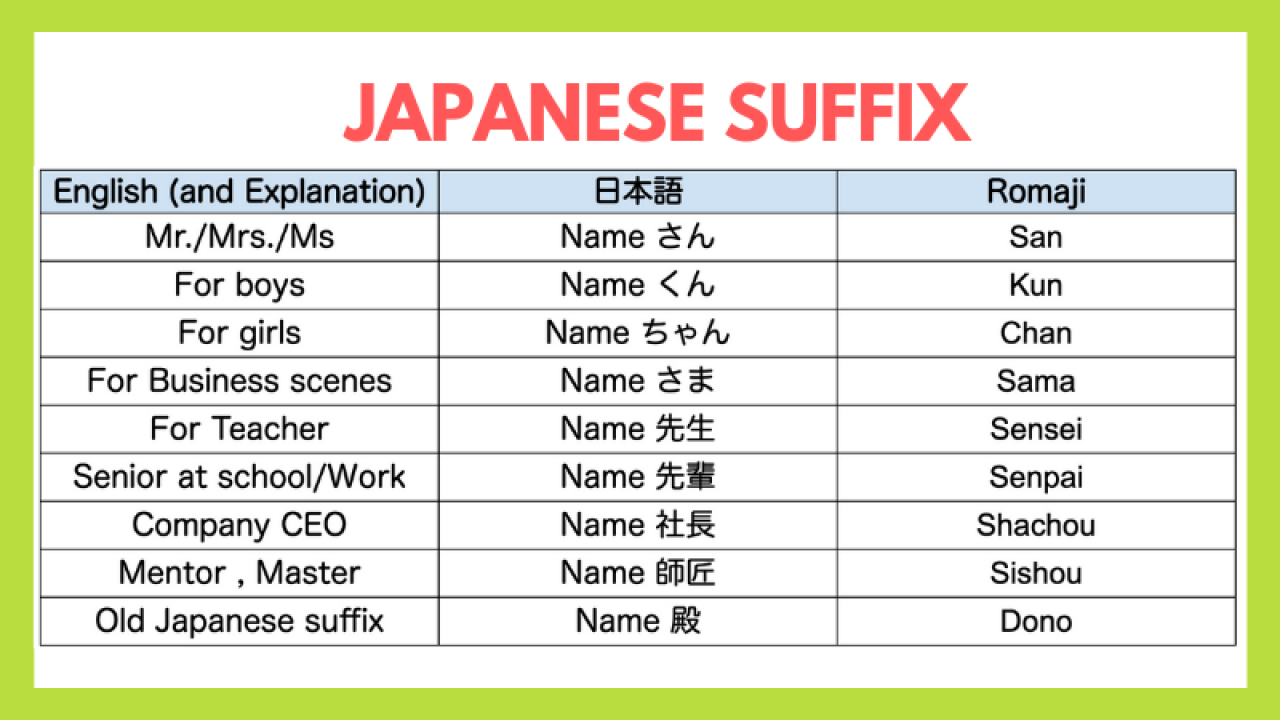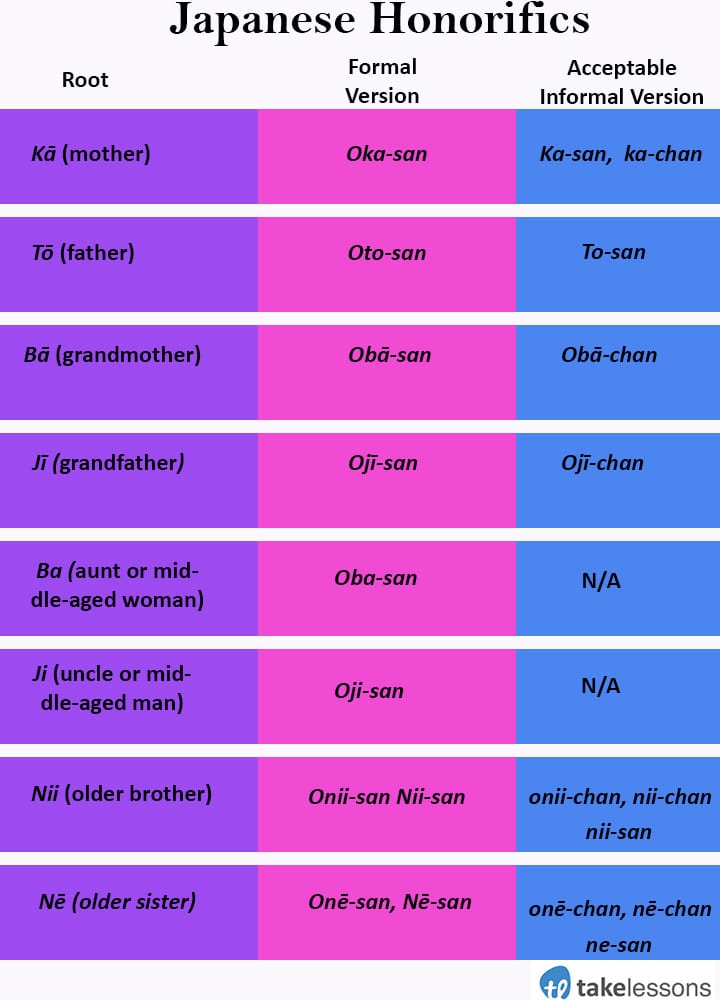Chan is a honorific that denotes informality or endearment and often used to younger or newer at work counterparts and usually to females. The change from san to chan is a kind of baby talk.

10 Ways To Use Japanese Honorifics San Kun Chan Sama Senpai
But no matter how hungry I was I neverand I mean neverate the little black thing at the end of the banana.

What does chan mean at the end of a name. Chan ちゃん is a form of san used to refer to children and female family members close friends and lovers. Using chan with a superiors name is considered rude and condescending. 22042010 Japanese honorifics.
A term used to address an individual who is in a higher standing than oneself in a particular environment or context. Chan is also used for adults who are considered to be kawaii cute or.
04092019 In the end Jang Man-Wol chose Goo Chan-Seong but it would be a bittersweet moment for the two. Sounds are turned into ch. Generally it is used for babies teenager girls young children and grandparents.
The Japanese language makes use of honorific suffixes and prefixes when referring to others in a conversation. In the form of endearment. 10012020 Another word that you see ちゃん used on is one of the Japanese words for baby.
27092017 Understanding website names - what the three-letter extensions mean One easy way to help spot fake e-mail messages is to learn the meaning of Top-Level Domains TLD -- those three-letter extensions at the end of a web link or e-mail address. 04042016 Chan the childish version of san refers to children and girls. It means cute or little.
The table below shows the various name stems used in this effort. 14112011 Chan ちゃん this suffix shows the speaker finds a person endearing. The change from s sound to ch is considered cute in Japanese.
The Japanese suffix -chan. These honorifics are gender-neutral and can be attached to first names as well as surnames. When addressing or referring to someone by name in Japanese an honorific suffix is usually used with.
Chans always notice the small things in life and they are always grateful for everything. And as say your name you mimic the name in the hand shake movement.
He is one of the most loyal and trustworthy people you can ever meet. Its normally attached to the end of a persons name. 07052021 The notebook has the ability to kill anyone as long as the user knows the targets name and face.
Country or region Korea Republic Of. The table has columns for the Generic Name Stem a Stem Definition and an Example. Suffixes are attached to the end of names and are often gender-specific while prefixes are attached to the beginning of many nouns.
19062021 Its Italian roughly for nice to meet you my name is twisty trombone. Japanese uses a broad array of honorific suffixes for addressing or referring to people. Sounds such as chitchai for chiisai small.
As prophesized throughout the series Chan-Seong would be the one to send off Man-Wol to the. For example right now Im called Gaby-chan by everyone in my lab. 03032020 Chan is used ALL THE TIME to refer to ADULT females.
Its a bit more complicated than that though. I call my wife Mitsue-chan and it means My sweet girl or My little girl or My little loved one and MY FRIENDS call my wife Mitsue-chan because she is YOUNGER than them and they are. Honorific suffixes also indicate the level of the speaker and referred individuals relationship and are often used alongside other components.
Light begins using the notebook to kill some of. Most guys would love to be like Chan when it comes to the factors of how sweet and caring he is. Like for kun friends and lovers can also address each other with this honorific.
The use of san kun chan and sama. There are quite a few Japanese words for baby but this one is by far the most common. Is a term friends and family usually girls add to the end of your last or first name.
His heart is so open and kind but when he finds who he thinks is. In Japanese where sh. In stories set in academic contexts but it more precisely means mentor.
Because it was an unspoken rule among children that the black tip of a banana should be avoided like the plague. A sweet guy who can never understand how big his heart is. Honorifics that can also be used as standalone forms of address-senpai-sempai 先輩.
In this case the word is 赤ちゃん aka chan which adds ちゃん onto the Japanese word 赤 aka which means. Each stem has hyphens at one or both ends of its text to show that it is found at the beginning end or in the middle of a generic name. Death would surely result from ingesting it or some other unspeakable horror.
It is most commonly used to refer to upperclassmen.

Chan Kun Senpai Japanese Honorifics Japan Powered

Japanese Honorifics San Sama Kun Chan Dono Motivist Japan

Japanese Honorific Titles San Sama Kun And Chan Coto Japanese Academy

To San Or Not To San Should You Use The Japanese Honorific Suffix When Speaking English Japan Today

10 Ways To Use Japanese Honorifics San Kun Chan Sama Senpai

Japanese Honorifics Guide San Kun Chan Sama And More Japanesepod101 Com Blog

Japanese Honorifics Formal Informal Name Suffixes Takelessons

Re Zero S Japanese Honorifics Sama San Kun Chan Tan Dono Explained Youtube

Japanese Honorific Titles San Sama Kun And Chan Coto Japanese Academy

0 komentar:
Post a Comment